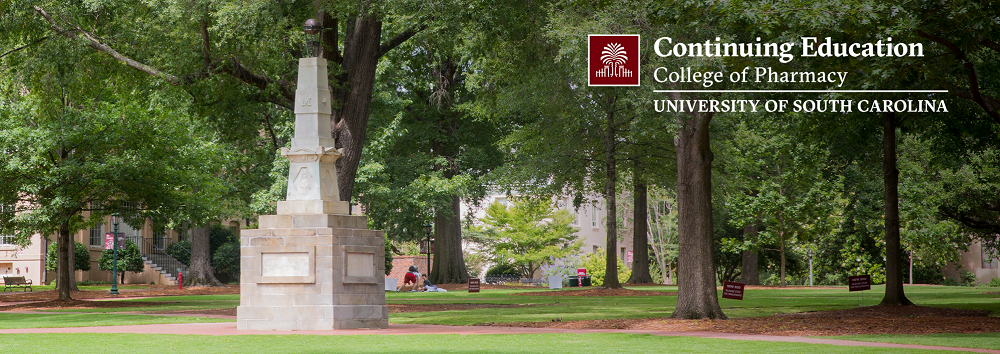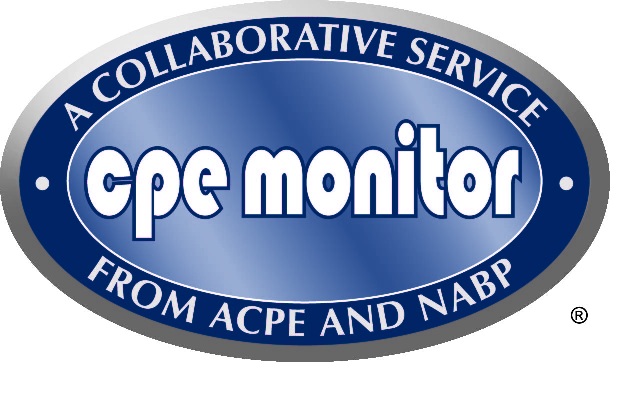
|
8:00 am-
9:00 am
|
Check In and Breakfast
|
|
9:00 am-
10:00 am
|
Once in a lifetime: bridging the generational gap in medicine
Brittany Jones, PharmD; Ambulatory Care Clinical Specialist and Adjunct Assistant Professor, Medical University of South Carolina, Charleston, SC
ACPE UAN 0062-9999-19-065-L01-P/T
(1.0 credit hours, 0.1 CEU; disease state management/drug therapy; application-based)
Learning Objectives:
At the completion of this activity, the pharmacist and pharmacy technician will be able to:
|
|
10:00 am-10:15 am
|
Break
|
|
10:15 am-
12:15 pm
|
New Drug Update 2018-2019
C. Wayne Weart, Pharm.D., BCPS, FASHP, FAPhA; Professor Emeritus, Department of Clinical Pharmacy and Outcomes Sciences, MUSC College of Pharmacy
ACPE UAN 0062-9999-19-063-L01-P/T
(2.0 credit hours, 0.2 CEU; disease state management/drug therapy; knowledge-based)
Learning Objectives:
At the conclusion of the program, the pharmacist will be able to:
At the conclusion of the program, the pharmacy technician will be able to:
|
|
12:15 pm-
1:00 pm
|
Lunch
|
|
1:00 pm-
2:00 pm
|
Medication Errors in Solid Organ Transplant: Leveraging Technology to Reduce Risk
Dr. James Fleming, PharmD, BCPS; Clinical Pharmacy Specialist and Affiliate Associate Professor, Medical University of South Carolina, Charleston, SC
ACPE UAN 0062-9999-19-062-L05-P/T
(1.0 credit hours, 0.1 CEU; patient safety; application-based)
Learning Objectives:
At the conclusion of the program, the pharmacist and pharmacy technician will be able to:
|
|
2:00 pm-
3:00 pm
|
Piecing together the pain puzzle: exploring multimodal non-opioid pain management strategies
Dr. Emmeline Tran, PharmD, BCPS; Assistant Professor, Medical University of South Carolina; Internal Medicine Clinical Specialist, Ralph H. Johnson VA Medical Center; Charleston, SC
ACPE UAN 0062-9999-19-064-L01-P/T
(1.0 credit hours, 0.1 CEU; disease state management/drug therapy; application-based)
Learning Objectives:
At the conclusion of the program, the pharmacist will be able to:
At the completion of this activity, the pharmacy technician will be able to:
|
|
3:00 pm-
3:15 pm
|
Break
|
|
3:15 pm-
4:15 pm
|
Updates in treatment of cancer-associated thrombosis and HIT
Dr. Nicole Bohm, PharmD, BCPS; Associate Professor and Internal Medicine Clinical Specialist; Medical University of South Carolina, Charleston, SC
ACPE UAN 0062-9999-19-066-L01-P/T
(1.0 credit hours, 0.1 CEU; disease state management/drug therapy; application-based)
Learning Objectives:
At the conclusion of the program, the pharmacist will be able to:
At the completion of this activity, the pharmacy technician will be able to:
|
|
4:15 pm-
4:30 pm
|
Wrap Up and Accessing CE Documentation
|
Date: Mar 23, 2019 09:00 AM - 04:30 PM
CE Hours
CE Units
Activity Type
- Knowledge-Based and Application-Based
Target Audience(s)
- Pharmacists
- Pharmacy Technicians
Accreditation(s)

|
The University of South Carolina College of Pharmacy is accredited by the Accreditation Council for Pharmacy Education as a provider of continuing pharmacy education.
|
Co-Sponsor(s)
Requirements for CE Credit
- Discuss trends in epidemiology of the average lifespan over the past century
- Assess the physiological changes occurring at different stages of life and how they affect medicine within the body
- Differentiate between the generations including key characteristics of each group
- Recommend ways for which the pharmacist and pharmacy technician can increase adherence across the generational gap
Speaker(s)/Author(s)
|
Brittany Jones, PharmD
|
Activity Number
0062-9999-19-065-L01-P/TCE Hours
- Discuss the new guidelines for type 2 diabetes, lipids, resistant hypertension and HFrEF, the evidence on which they are based, and how to apply them in selected patients
- Describe the current information concerning newly FDA approved medications (pharmacology, pharmacokinetics, efficacy and safety data, drug interactions, dosing, monitoring, and cost) in the selection of evidence-based pharmacotherapy
- Discuss the new guidelines for type 2 diabetes, lipids, resistant hypertension and HFrEF and the evidence on which they are based
- Describe the current information concerning newly FDA approved medications (pharmacology, pharmacokinetics, efficacy and safety data, drug interactions, dosing, monitoring, and cost)
Speaker(s)/Author(s)
|
C. Wayne Weart, PharmD, FASHP, FAPhA
|
Activity Number
0062-9999-19-063-L01-P/TCE Hours
- Describe the incidence of medication errors in solid organ transplant
- Examine unique risk factors for medication errors in transplant patients
- Appraise the potential for technological solutions to prevent medication errors
Speaker(s)/Author(s)
|
James Fleming, PharmD, BCPS
|
Activity Number
0062-9999-19-062-L05-P/TCE Hours
- Identify challenges in pain management in the acute care setting
- Discuss multimodal pain management strategies
- Evaluate recent literature pertinent to the use of nonopioid analgesics
- Integrate recent evidence-based recommendations into clinical practice
- Identify challenges in pain management in the acute care setting
- Define multimodal pain management
- Discuss medications used in multimodal pain management
Speaker(s)/Author(s)
|
Emmeline Tran, PharmD, BCPS
|
Activity Number
0062-9999-19-064-L01-P/TCE Hours
- Contrast outcomes data for direct oral anticoagulants (DOACs) to historical standard of care anticoagulants in cancer-associated thrombosis
- Recognize patients with heparin induced thrombocytopenia who may be candidates for DOACs
- Identify patient characteristics that may compromise DOAC safety or efficacy
- Recognize common dosing strategies for DOACs in VTE
- Identify patient characteristics that may impact DOAC safety or efficacy
Speaker(s)/Author(s)
|
Nicole Bohm, PharmD, BCPS
|

